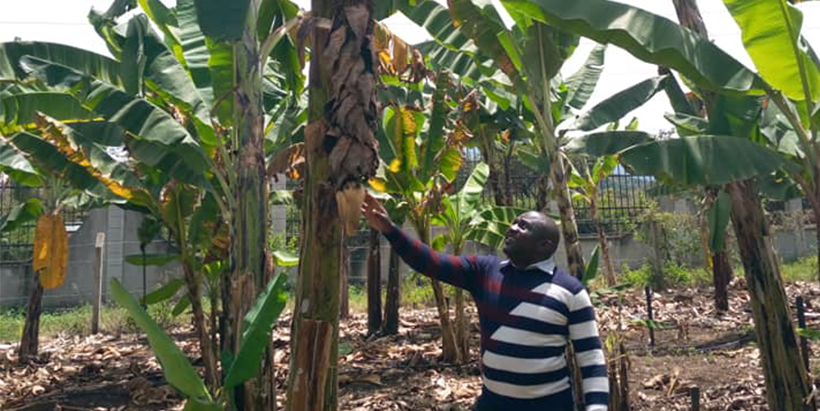Four Fusarium wilt-resistant Mchare cooking bananas have been handed over by the International Institute of Tropical Agriculture (IITA-CGIAR) and collaborators; Nelson Mandela African Institution of Science and Technology (NM-AIST); Tanzania Agricultural Research Institute (TARI); and Tanzania Official Seed Certification Institute (TOSCI) for multi-site evaluation, in a bid to holistically address the threat of Fusarium wilt (FW) to banana production in the country. This landmark achievement by the IITA team, in conjunction with its partners, would highlight the importance of bananas, as a key food and cash crop, as well as a driving force behind the development of smallholder farmers’ economies in Tanzania.
For eight years, the IITA’s Department of Breeding and Internal Pathology collaborated with partners from Wageningen and Stellenbosch Universities to generate Mchare hybrids resistant to various races of the Fusarium wilt fungus. Fusarium wilt disease is a devastating ailment of bananas caused by the soil-inhabiting fungus species, Fusarium oxysporum forma specialis cubense. Known locally as Panama disease, Race 1 has become a nightmare to Tanzanian farmers as the fungus can exist in the soil for about 20 years. Another strain, the Tropical Race 4 (TR4), is present in neighbouring Mozambique.
A banana breeder and staff of IITA, Allan Brown, said, “The resistant Mchare hybrids will ensure that Tanzanian farmers will be able to deal with the FW strains present in Tanzania today and those they are likely to encounter in the future”. In addition to being resistant to FW, Brown also noted that the texture, colour, aroma, and flavour of the new hybrids suggest that they are not significantly different from conventional Mchare landraces, according to consumer preference scores, however, they have increased yields of up to 65%.
The lead banana breeder from IITA, Rony Swennen, while commending the remarkable achievement, said that development of the new product profile in seven years was a landmark success, testament to the hard work of the team in Tanzania, and the great relationship between IITA, national programmes and international partners. Tanzania, the world’s leading producer of Mchare bananas, as well as some parts of Kenya and other East African nations, favour Mchare bananas for cooking. The Kilimanjaro region of Tanzania produces an estimated 700,000 to one million tons of bananas annually, with a single bunch of Mchare fetching up to US$20 in the local markets, according to government officials.

